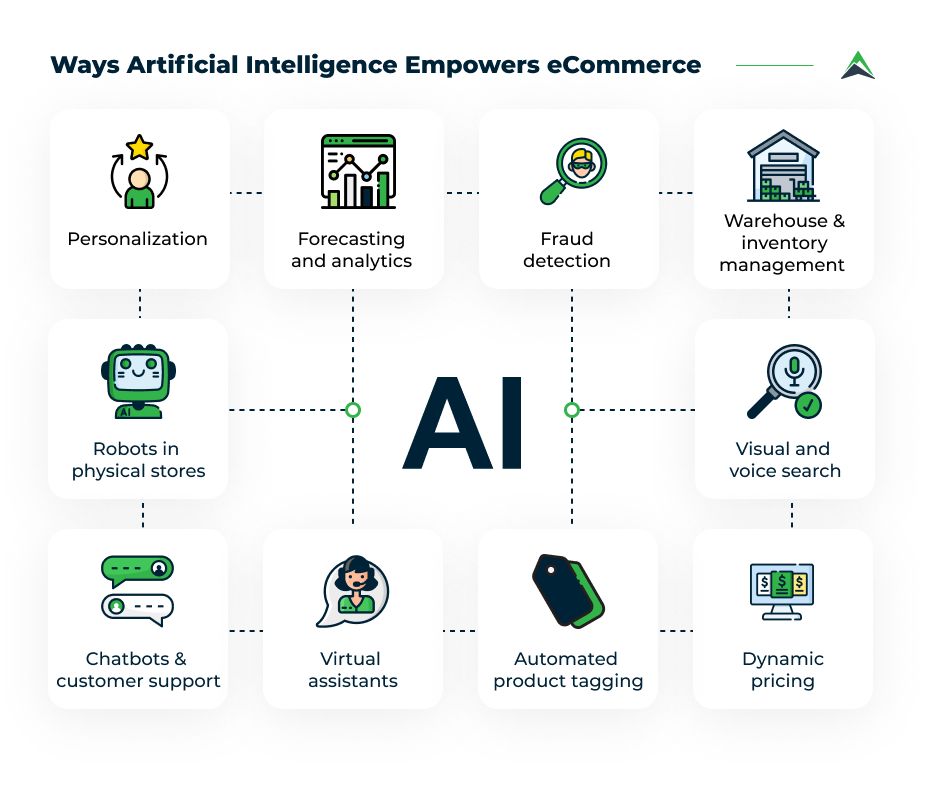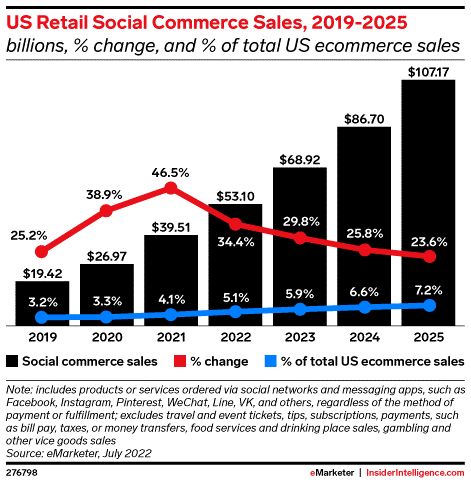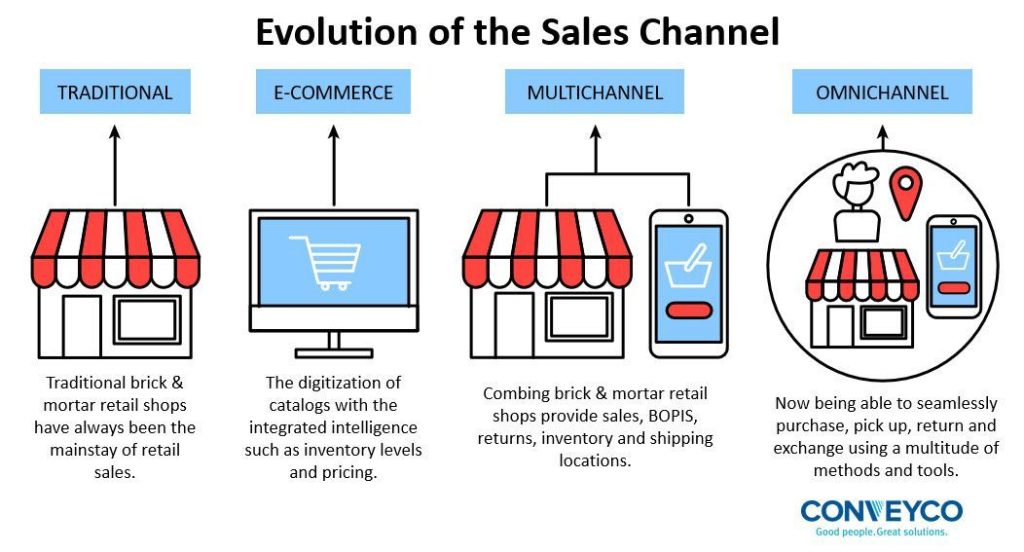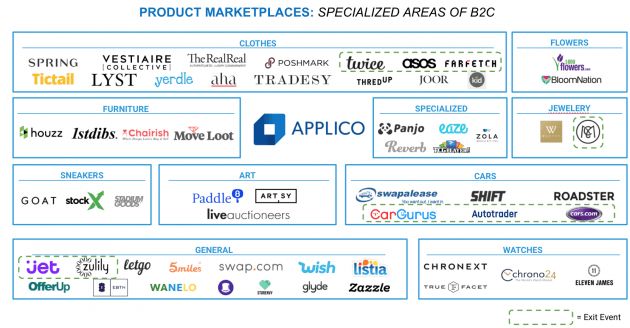The rapid evolution of digital marketplaces is reshaping the global retail infrastructure, pushing e-commerce to new heights. Marketplaces are now integrating cutting-edge technologies, adopting new strategies, and transforming to meet consumer expectations.
This article examines emerging trends such as Artificial Intelligence (AI), personalization, social commerce, and the rise of niche marketplaces, which are collectively influencing consumer behaviour and setting the trajectory for the future of online commerce. Industry leaders, entrepreneurs, and decision-makers can leverage these insights to capitalize on these developments, strengthening their position in an increasingly competitive market.
#1: The Role of AI and Machine Learning: Driving Personalization and Efficiency
AI has become essential for digital marketplaces, as it enhances the customer experience by creating personalized and streamlined shopping journeys. As competition intensifies, marketplaces are increasingly using AI and machine learning to optimize various aspects of their operations, from product recommendations to pricing strategies.
According to Forrester, marketplaces that embrace AI to its full potential will be able to predict consumer needs with greater accuracy, creating a smoother and more intuitive shopping experience (Forrester, 2023). By advancing AI capabilities, these platforms will be better equipped to anticipate and meet consumer demands, thus enhancing customer loyalty.
Enhancing Personalization and Customer Engagement
AI algorithms analyze vast amounts of data to tailor the shopping experience. According to a report from McKinsey, personalization efforts driven by AI can increase marketing efficiency by up to 20% and drive revenue growth between 10% and 30% (McKinsey & Company, 2023).
Amazon is a prime example of this approach, as its recommendation engine accounts for an estimated 35% of total sales, which underscores the power of tailored recommendations. By continuously analyzing customer data—such as past purchases, search history, and demographics—AI-powered personalization can foster stronger customer loyalty.
AI is also enhancing customer service through chatbots and virtual assistants, which provide customers with real-time responses to their queries. According to a 2022 survey, nearly 60% of consumers interacted with a chatbot at least once, demonstrating the increasing acceptance of AI-driven customer support (Statista, 2022). These chatbots not only streamline customer service but also reduce costs for companies by minimizing the need for human intervention.
Optimizing Pricing and Inventory Management
Dynamic pricing, enabled by machine learning algorithms, has become a key tool in digital marketplaces. Platforms such as Alibaba and Amazon use machine learning to adjust prices based on competitor rates, demand fluctuations, and customer behaviour. This pricing agility can drive profitability gains of up to 25%, as reported by Forrester (Forrester, 2023). AI also optimizes inventory management by predicting demand and reducing stockouts, improving customer satisfaction and operational efficiency.
#2: The Rise of Social Commerce and Community Building
Social commerce—the convergence of social media and e-commerce—has become a vital trend for engaging the digital-native consumer, especially Generation Z. By blending shopping and social interactions, digital marketplaces can reach younger audiences, foster brand loyalty, and cultivate a sense of community.
Influencer Partnerships and User-Generated Content
Influencer partnerships are a critical aspect of social commerce. As reported by Statista, influencer marketing on social media is expected to grow to $24.1 billion by 2025, largely due to brands targeting Gen Z consumers who prefer authentic recommendations over traditional advertisements (Statista, 2023).
Platforms like Etsy and Depop have used influencer partnerships to build trust among their target demographics and expand their reach. User-generated content (UGC), such as customer reviews, testimonials, and social media shares, plays an important role in social commerce by building brand credibility.
Marketplaces that leverage UGC can improve customer trust and loyalty, as potential buyers are more likely to trust peer recommendations. Amazon’s Vine program, which invites select customers to write product reviews, exemplifies how marketplaces can use UGC to sway purchasing decisions and create a more engaged community.
Fostering Community and Building Brand Loyalty
Community-focused marketplaces like Poshmark and Depop have taken social commerce a step further by fostering interactions among users, such as sharing fashion tips or recommending products.
This social integration promotes a sense of belonging and builds loyalty, particularly among younger consumers who value authenticity and connection in their shopping experiences. As social commerce continues to grow, community-building strategies are expected to play an increasingly pivotal role in marketplace success.
#3: Omnichannel Integration: Bridging Online and Offline Experiences
As digital marketplaces mature, omnichannel integration has emerged as a crucial strategy for providing a seamless shopping experience across online and offline channels. In a post-pandemic world, consumers expect a blend of digital convenience with the tangibility of in-store experiences.
Digital Marketplaces Expanding into Physical Retail
Major players like Amazon and Alibaba have ventured into physical retail to complement their online presence, offering “click and collect” options that merge online and offline shopping. Alibaba’s Hema grocery stores, for example, allow customers to shop in-store or online, with the option for delivery or in-store pickup, creating a convenient and personalized shopping journey. Amazon’s expansion into brick-and-mortar stores through Amazon Fresh similarly demonstrates how omnichannel integration can create a cohesive customer experience.
Leveraging Data for a Unified Customer Journey
By connecting online and offline data, omnichannel integration enables marketplaces to provide a unified customer journey. For instance, Walmart leverages online data to enhance its in-store experience, enabling customers to order online and pick up in-store, which combines digital convenience with traditional shopping services. A consistent experience across all touchpoints not only increases customer satisfaction but also gives companies valuable insights into consumer behaviour across channels.
#4: The Emergence of Niche Marketplaces
In response to consumers’ demand for specialized and curated shopping experiences, niche marketplaces have grown rapidly. These marketplaces serve focused interests, whether it be sustainable products, handmade crafts, or vintage clothing, and often attract loyal customers who seek unique products and a sense of exclusivity.
Specialization in Consumer Offerings
Platforms like StockX for sneakers and Goat for streetwear demonstrate how catering to specific markets can build consumer loyalty. Niche marketplaces stand out by offering curated selections, making it easier for customers to find products aligned with their preferences. As consumers increasingly seek unique, high-quality products, niche marketplaces are poised to thrive by providing specialized shopping experiences that larger platforms cannot replicate.
The Impact of Sustainability and Ethical Consumerism
A survey conducted by Gartner in 2022 revealed that 80% of consumers prioritize sustainability when making purchasing decisions (Gartner, 2022). Digital marketplaces like The RealReal and ThredUp, which focus on luxury resale and secondhand clothing, have capitalized on this trend by catering to environmentally conscious consumers.
These marketplaces provide transparency around product authenticity and sustainability, appealing to a growing segment of customers who consider ethical factors in their purchasing decisions. Long-term, platforms that lead in sustainable practices, from carbon-neutral shipping to ethical sourcing, will differentiate themselves in the market and meet rising consumer expectations for corporate responsibility.
Conclusion
In conclusion, the digital marketplace industry is poised for continued transformation. Marketplace leaders can enhance consumer engagement and stay competitive in an increasingly dynamic market by capitalizing on the following.
- Leverage AI for Personalization and Operational Efficiency: Invest in AI technology to enhance personalization, streamline customer support, and optimize pricing. AI-driven personalization has proven effective in driving customer engagement and increasing sales.
- Embrace Social Commerce and Community Building: Integrate social elements such as user-generated content and influencer partnerships into your marketplace. Building a community around your brand can strengthen customer loyalty and create a more engaging shopping experience.
- Implement Omnichannel Integration: Develop strategies to provide a seamless experience across online and offline channels. By offering options like in-store pickup or unified loyalty programs, you can create a consistent customer journey that meets consumer expectations for convenience and flexibility.
- Capitalize on Niche Markets and Specialization: Consider specializing in specific product categories to attract dedicated consumer segments. Curated, niche marketplaces often foster strong brand loyalty and can better meet the needs of consumers looking for unique and high-quality products.
Bibliography
- Forrester Research (2023). Predictions 2023: Commerce
- McKinsey & Company (2023). What is personalization?
- Gartner, Inc (2024). Top Trends in Cybersecurity for 2024
- eMarketer (2022). TikTok will drive social commerce growth in 2023
- Conveyco (2023). Omnichannel Fulfillment Trends to Look for in 2023
- Applico (2021). The Rise of Specialized Marketplaces in eCommerce
- Statista (2022). Retail technology impact on shopping experience in the U.S. 2022
- Econsultancy (2022). Influencer marketing in 2023: What do the experts predict?
- Eastern Peak (2021). 10 Ways Artificial Intelligence is Transforming eCommerce













